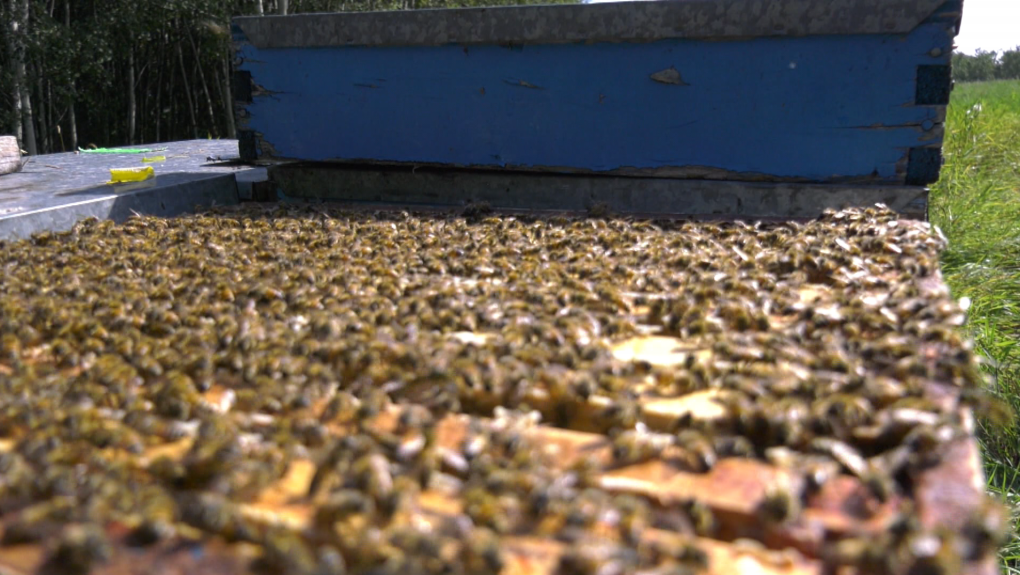Drought has Alberta beekeepers feeling the sting of another 'tough year'
The unseasonably hot summer is complicating production for Alberta beekeepers.
But it’s not just this year. The president of Good Morning Honey in Parkland County, Richard Ozero, said it was too smoky in 2018, too soggy in 2019 and on top of the pandemic in 2020, it was too wet at the beginning of the season.
Ozero noted it’s been tough for people in the agriculture business to catch a break.
“2021 has been a drought and a rollercoaster of expectations for beekeepers across most of Alberta,” he said. “It’s a tough year to take.”
Because of the drought, Ozero explained the bee colony is shrinking as the scorching heat has wiped out major food sources for the bees to survive.
“It caused big stress on a lot of the plants, so they shutdown their nectar production,” he added.
“You saw bees not able to collect nectar from those sources. Bees were looking for nutrition that wasn’t there.”
Since the season started early this year for most provincial beekeepers, Ozero said they saw “nature kick into high gear” and it caused a ripple effect throughout the entire season.
“It won’t be a huge crop but it won’t be a wreak either,” Jeremy Olthof, owner of Tees Bees Inc, added.
'THEY NEED TO SURVIVE'
The beekeeping season generally starts in March and goes until mid-to-late October but some beekeepers have already started prepping for winter.
“The rush is on to get these bees everything they need to survive,” Ozero said.
“Just to have it fizzle in front of you when it’s not in your control is disheartening.”

As a way to ensure the survival of the bees, beekeepers tend to supplement the pollen with feed and sugar water.
However, the food source isn’t the only issue. Olthof explained the heat didn’t only cause the bees to multiply, but the mites as well.
“If we can’t get ahead of these mites I’m really worried of some high losses in the spring,” he said.
On top of those looming concerns, Olthof said the excessive rain, hail storms and drought across Alberta could potentially drive up costs.
“That’s our fear you get high prices with low supply and the packers could start looking elsewhere,” Olthof said.
“You put so much money in as an agricultural producer and you have these high expectations and you don’t expect a high return just expect somewhere average where you can make it all worth your while,” Ozero said.
'MAYBE NEXT YEAR'
“We’re a resilient bunch,” Ozero added.
“The beekeepers and the bees will find a way to make it happen but it’s another year of struggles. It would be nice to catch a break… as we say in agriculture, ‘Maybe next year.’”
With files from CTV News Edmonton’s Touria Izri
CTVNews.ca Top Stories

Young people 'tortured' if stolen vehicle operations fail, Montreal police tell MPs
One day after a Montreal police officer fired gunshots at a suspect in a stolen vehicle, senior officers were telling parliamentarians that organized crime groups are recruiting people as young as 15 in the city to steal cars so that they can be shipped overseas.
'It was joy': Trapped B.C. orca calf eats seal meat, putting rescue on hold
A rescue operation for an orca calf trapped in a remote tidal lagoon off Vancouver Island has been put on hold after it started eating seal meat thrown in the water for what is believed to be the first time.
Man sets self on fire outside New York court where Trump trial underway
A man set himself on fire on Friday outside the New York courthouse where Donald Trump's historic hush-money trial was taking place as jury selection wrapped up, but officials said he did not appear to have been targeting Trump.
Sask. father found guilty of withholding daughter to prevent her from getting COVID-19 vaccine
Michael Gordon Jackson, a Saskatchewan man accused of abducting his daughter to prevent her from getting a COVID-19 vaccine, has been found guilty for contravention of a custody order.
Mandisa, Grammy award-winning 'American Idol' alum, dead at 47
Soulful gospel artist Mandisa, a Grammy-winning singer who got her start as a contestant on 'American Idol' in 2006, has died, according to a statement on her verified social media. She was 47.
She set out to find a husband in a year. Then she matched with a guy on a dating app on the other side of the world
Scottish comedian Samantha Hannah was working on a comedy show about finding a husband when Toby Hunter came into her life. What happened next surprised them both.
B.C. judge orders shared dog custody for exes who both 'clearly love Stella'
In a first-of-its-kind ruling, a B.C. judge has awarded a former couple joint custody of their dog.
Saskatoon police to search landfill for remains of woman missing since 2020
Saskatoon police say they will begin searching the city’s landfill for the remains of Mackenzie Lee Trottier, who has been missing for more than three years.
Shivering for health: The myths and truths of ice baths explained
In a climate of social media-endorsed wellness rituals, plunging into cold water has promised to aid muscle recovery, enhance mental health and support immune system function. But the evidence of such benefits sits on thin ice, according to researchers.
































